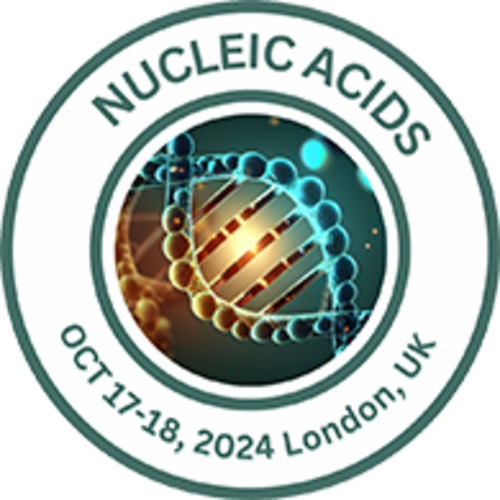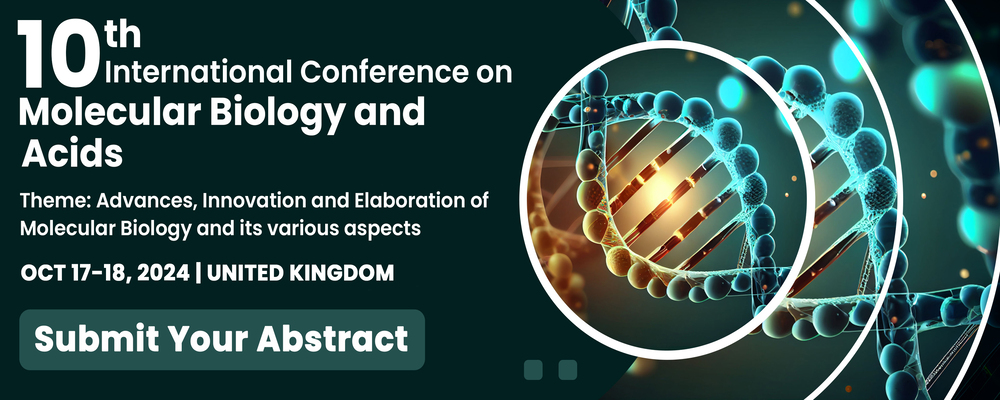


10th International Conference on Molecular Biology and Nucleic Acids
Advances, Innovation and Extension and Elaboration of Molecular Biology and its various aspects
Oct 17-18, 2024
|
London, United Kingdom
LexisConferences Conferences invites you to the 10th International Conference on Molecular Biology and Nucleic Acids being held in London, UK, on October 17-18, 2024. We are a global leader in organizing quality conferences, meetings, workshops, and symposiums in the major fields of science, technology, and medicine. LexisConferences Conferences Meetings hosts more than 1,000 global events in the US, Europe, and Asia each year. Asia with the support of 1,000 other scholarly societies and publishes over 700 open-access journals, which include over 100,000 eminent figures, renowned academic editors and organizing committee members.
LexisConferences Conferences welcomes all directors and managers, company delegates, founders, laboratory directors, universities, industries, researchers, doctoral students, research and diagnostic laboratories, clinical fellows, students and experts for the prestigious Nucleic Acid 2024 conference, making it an ideal platform for sharing and exploring the latest discoveries, clinical experiences, research results, new strategies and the development of new technological applications for innovation and modernization worldwide.
About Conference:
Nucleic Acids 2024 is a scientific conference taking place on October 17-18,2024 in London, UK, as a physical conference. The conference brings together researchers, academics, students and industry experts from around the world to present and discuss their latest research, innovations and technologies related to molecular biology and nucleic acids. The theme of the conference is "Advances, Innovation and Expansion and Development of Molecular Biology and Various Aspects.".
This suggests that the conference will focus on reviewing the latest advances in molecular biology and nucleic acid research, with an emphasis on expanding and advancing existing knowledge. The conference will feature keynote addresses, plenary sessions, poster sessions and panel discussions on a wide range of topics related to molecular biology and nucleic acids, including DNA replication and repair, transcription and DNA processing. RNA, protein synthesis, gene regulation, genomics, bioinformatics and synthetic biology
The conference also offers extensive networking and collaboration opportunities to encourage the exchange of ideas and knowledge between researchers and industry professionals. The summit is expected to be a highly informative and engaging event for anyone interested in the latest advances in molecular biology and nucleic acid research.
Why is it worth participating?
It is a great opportunity to learn about the latest research, discoveries and technologies in this field. By attending presentations and keynotes from leading experts, you'll gain insight into emerging trends and stay up-to-date with the latest developments.
The summit will bring together researchers, academics, students and industry professionals from around the world and provide an excellent opportunity to network and build new relationships. You can meet and connect with people who share your research interests, which may lead to potential collaborations and partnerships. Nucleic Acids 2024 provides a platform for presenting research to a global audience that can help you gain valuable feedback, enhance your research, and build your professional reputation. Also, it can help you advance your career by providing the opportunity to learn from industry experts, meet potential employers and discover new job opportunities. Engagement with new techniques and technologies often involves exhibitions and poster sessions showcasing the latest products, technologies and services in the field. This can provide access to new techniques and tools that can help advance research. Attending a molecular biology conference can be a great way to expand your knowledge, network with peers and industry experts, and advance your career.
Benefits of attending:
- Access to all scientific sessions (lectures, plenary sessions, workshops, symposia, poster presentations)
- You will become a member of the International Organizing Committee (IOCM) certificate.
- Complete conference package with a reminder of the conference and the final program (electronic copies ) abstracts are published in relevant international journals and conference proceedings
- Each abstract is assigned a unique DOI number, which is assigned through Cross Ref Commendable speeches from the world's leading scientific community
- Website for over 35,000 visitors in less than 6 months
- Keynote addresses by the world's leading scientists
- Industry leaders
- Symposia and reflections Inspiring workshops Outstanding awards and global recognition for outstanding scientists: Best Poster Award nominations
- The Best Young Researcher Award is for the most promising young
scientists. - Group Registration Benefits (25% discount)
- Advanced Research-Oriented Lectures: Academic and Research Collaboration
- The triumph of awards and certificates demonstrating your commitment to your profession and encouraging new research
- A wide variety of exhibitors are showcasing new and emerging technologies.
- A platform for the global investment community to engage with stakeholders.
- An excellent platform for product presentation and international sponsorship.
- The best platform to develop new partnerships and projects Cooperation.
- The best location to travel faster anywhere in the world
- 89% of our conference attendees are key contacts in their universities.
corporations - Organizations, hospitals, medical centers and laboratories when making purchasing decisions related to their field of study.
Supporting Journals
All the selected Abstracts/ papers presented will be published in the Supporting Journals below:
• Journal Name: Journal of Microbiology and Biotechnology Reports
• Journal Name: Journal of molecular cell biology
• Journal Name: Journal of Molecular Virology and Immunology
Join our team Nucleic acid 2024 in this beautiful city of London and let us make this professional gathering a Great success.
Target Audience: -
Pharmaceutical & Biotechnology Companies
-
Researchers, innovators, and scientists
-
Doctors and scholars
-
R & D Labs
-
Professors and Students
-
Pharmacists and Medical representatives
-
Noble laureates in Health Care and Medicine
-
Universities and Research Institutions
-
Related Associations, Societies, and Professional Bodies
-
Supply Chain and Manufacturing Companies
-
Product Developers
-
Experts Looking for Collaborative Work
-
Bio professionals
-
Solution Providers
-
Industry directors and Leaders
-
Bio-informatics Professionals
-
Directors of Biotech and Pharma Associations
-
Sales & Marketing Professional
-
Founders and Employees of the related companies
-
Heads, Deans and Professors of Biotechnology and related departments
-
Management, business leaders, and/or agents
-
Writers
Market Analysis:
The molecular biology market is a rapidly growing market driven by the growing demand for personalized medicine and advances in technology. The market includes various products such as reagents, kits, instruments and software used in research, diagnosis and treatment of diseases. According to a report by MarketsandMarkets, the global molecular biology market is expected to reach US$17.2 billion by 2025 and will grow at a CAGR of 11.4% from 2020 to 2025.The report further states that the rising incidence of infectious diseases and genetic diseases, as well as the growing demand for PCR and NGS technologies, are some of the key factors behind the growth of the market. Geographically, North America is the largest market for molecular biology today, followed by Europe and Asia Pacific. However, due to increased R&D investment and growing demand for personalized medicine in the countries, the Asia-Pacific region is expected to register the highest CAGR during the forecast period.


Americas Dominate with Synthetic Biology: High Market Share and Growth
Global Genetics and Molecular Biology Universities:
North America:
-
Michigan State University, USA
-
University of California, USA
-
Arizona State University, USA
-
New York University, USA
Europe:
-
University of Cambridge, UK
-
University of Oxford, UK
-
University College London, UK
-
Imperial College London, UK
Middle East:
-
Cairo University, Egypt
-
Ain Shams University, Egypt
-
Zagazig University, Egypt
-
Kuwait University, Kuwait
-
Al Azhar University, Egypt
-
Alexandria University, Egypt
-
Mansoura University, Egypt
Global Genetics and Molecular Biology Research Centers & Associations:
America:
-
American College Of Molecular Biology Pathologists, USA
-
American Association for the Advancement of Science, USA
-
American Chemical Society, USA
-
Botanical Society of America, USA
-
California Academy of Sciences, USA
-
Society for Science and the Public, USA
Contact info:-
Austin Welch
Program manager| Nucleic acid 2024
Email: nucleicacids@globalannualsummit.com
Call for Submissions
Abstracts will be reviewed by the Abstract Review Board (ARB) of the conference
- Molecular Biology
- Molecular Biology of The Cell: An Introduction
- Cell Division
- DNA Structure
- Transcription of Genes
- Microbial genetics
- Gene Regulation
- Molecular Techniques and Current Research Approaches
- Nucleic Acids and Electrochemical Methods
- Soil Nucleic Acid Extraction
- Biomedical Applications of PNA
- Peptide Nucleic Acid PNA
- Chemically Modified Nucleic Acid Analogues
- Nucleic Acids and Their Analogues for Biomedical Applications
- DNA sequencing and Molecular Hybridization
- Functional genomics: a forensic perspective of biology
- Evolution and interdependence of life with RNA molecules
- Gene therapy and its uses
- Genomics and Proteomics
- Polymerase Chain Reaction
- Regulation of Transcription in Prokaryotes
- CRISPR and Genome Editing Advancements
- Synthetic Biology and Genetic Engineering
- Epigenetics and Epitranscriptomics
- Single-Cell Sequencing Technologies
- RNA Therapeutics
- Functional Genomics and Systems Biology
- Nanotechnology and Nucleic Acids
- Crispr Screening and Functional Genomics
- Environmental Genomics
- Ethical and Regulatory Considerations

































